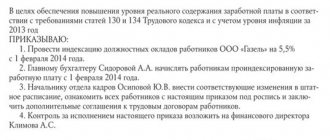There are those among us who have not gone on vacation for years. Some - due to gross violations of the Labor Code of the Russian Federation by management, others - at their own request. You don’t want to take a vacation, although you are entitled to a vacation with all payments by law, and you are wondering: is it possible to receive vacation money, but skip the vacation? Is it possible not to postpone the vacation, but to let it “burn out”? Let's figure out in the article whether such a scheme does not contradict Russian legislation and what can be done legally.
Is there a risk for the employee and the employer?
If, instead of going on vacation for a week, you agree with your boss that you will receive vacation pay, but will remain working on a full salary, then with the consent of the parties, such a scheme will not pose any threat to you personally. The vacation is not postponed, but conditionally expired. But if your manager humanly meets you, he may receive a fine and additional taxes for his kindness.
Is there a risk for the employee and the employer?
How to apply
An employee's departure on vacation is documented by order. The organization has the right to independently develop an order form, providing all the required details, or use the unified form T-6 (Order of the State Statistics Committee No. 1 of 01/05/2004)
Sample order form
To calculate vacation pay, a calculation note is drawn up.
Sample of a note-calculation
If an employee goes on paid vacation in accordance with the vacation schedule, he must be notified of the start of the vacation in writing. The form of notification has not been established. It is compiled in any form.
Sample notification format
What is said about vacation in the Labor Code of the Russian Federation
The employer undertakes to provide his subordinates with leave every year while maintaining their position and average monthly earnings. You can take a vacation completely and at once, or you can divide it into segments - but only so that one of them is no shorter than 14 days. The rest, if the authorities do not mind, can be divided into at least 1 day throughout the year.
Vacation is recorded in the vacation schedule, which is formed every year no later than 2 weeks before the arrival of the new calendar year. The schedule is certified by the manager. According to the law, vacation can be postponed or extended if, for example, you get sick. With your agreement, vacation may be interrupted, and you are called in due to business needs. But vacation days do not disappear, but are considered unused - you should be given them in the next working year at a time convenient for you or added to future vacation (for the new year of work).
The situation when you go on vacation, but then return back earlier than expected, is permissible by law. At the same time, working, receiving a salary for your work and at the same time being on vacation, having received pre-allocated vacation pay - this is already illegal.
You have the right to officially go on vacation, but in reality, come to the office every day at 9 a.m. and deal with work issues at your usual pace. The employer fulfilled its obligations in relation to the law and to you - it provided you with leave. And how you use it concerns you. But it will not be possible to receive both vacation pay and salary in the same period.
What is said about vacation in the Labor Code of the Russian Federation
Legislation on the issue under consideration
Downtime is a break in work for reasons of a technological, economic or organizational nature (Part 3 of Article 72.2 of the Labor Code of the Russian Federation). It arises due to:
- employer;
- employee;
- for reasons beyond the control of both parties.
IMPORTANT!
The latter case also includes the unfavorable epidemiological situation in the country and the coronavirus quarantine, in which many enterprises are forced to stop their work and go into idle mode.
During the introduction of downtime, the employee is either at the workplace or is relieved of this duty by decision of the employer. However, downtime is not recognized as rest time: the employee can be called to his workplace at any time.
Annual leave is guaranteed by the Labor Code to all working citizens (Article 114 of the Labor Code of the Russian Federation). The introduction of downtime for any reason is not an obstacle to providing the employee with paid rest. Labor legislation does not contain any restrictions in this regard.
Thus, leave during downtime due to the fault of the employer, as well as for any other reason, is provided in the usual manner.
IMPORTANT!
On April days declared as non-working days in the country, if the employee is on vacation, then these days are not included in the number of vacation days and vacation for these days is not extended.
What happens to vacation pay if you return from vacation?
3 days before your vacation starts, the employer will give you vacation pay. When you return from vacation, he is forced to deal with this money: you received funds for vacation, but did not use your vacation - what to do now?
There is no clear choice here. You can legally call an employee back from vacation by transferring unused days to a convenient time later. But the law does not say what to do with the money. Judicial practice also demonstrates a variety of precedents. One court ruled that since the employee was called back from vacation, but received vacation pay, the boss no longer owes him any money for this period. That is, vacation pay goes towards your monthly salary. When the subordinate leaves to finish spending his days, he will be given a new accrual of vacation pay.
Another court ruled that a recalculation was necessary. The tax office agrees with this: if a subordinate is called back from vacation, from the day of recall he must pay wages and enter this into personal income tax reports. Salaries are also subject to recalculation.
If, for example, your boss shows generosity by not recalculating and paying a salary in addition to vacation pay, then the tax office may consider this an understatement of the tax base and charge additional income tax.
Practice, according to observations, is very contradictory. Your manager cannot rely solely on the fact that the court will take his side. If this does not happen, management will also pay a fine - one fifth of the amount of unpaid tax.
Is it possible to replace vacation with financial compensation?
Monetary compensation can only be used if you are legally entitled to leave for more than 28 days a year. A number of professions (teacher, prosecutor, Ministry of Emergency Situations worker, etc.) have vacation from 30 to 56 days. The classic 28-day vacation can only be used for recreation and cannot be replaced with money. Only the vacation that the resigning employee has not used during this year is compensated.
If you go on vacation and then are immediately called back, then the law still gives you the opportunity to rest - this year or next year. In general, you cannot refuse to go on vacation.
If you do not go on your legal vacation for more than 2 years (no matter, at your own request or because of a tyrant boss), your director may be fined. Its size varies from 1,000 to 50,000 rubles, depending on the status of the person.
Is it possible to replace vacation with financial compensation?
How to do things your way without breaking the law
There are 4 options for how you can manage your vacation in your own way, but within the framework of the law. You can discuss them with management and choose the most optimal one.
- Civil contract
You are free to spend the time intended for relaxation on anything, so you have the right to draw up a GPC agreement with your own or a third-party organization for this time. Just keep in mind that such an agreement is drawn up for a specified type of work and has a deadline within which a certain result must be obtained. If the subject of the GPC agreement is your usual duties, then it acquires the status of an employment contract. You will again find yourself in an unlawful situation with the replacement of vacation with monetary compensation and subsequent administrative consequences.
- Dismissal
This method does not violate the law, but it carries a great risk for the employee. If you did not go on vacation, then upon termination of the employment contract, the employer must compensate you financially. Having complete confidence in your boss, agree that you will quit and receive compensation payments, and then re-employ him.
There is a possibility that you may not be reinstated. Therefore, this method is possible with complete trust in the employer and confidence that you will be hired again, under a contract and on the same terms.
- Bonuses
If your boss doesn't mind rewarding you for your success, ask for a bonus. You work harder for this conditional vacation week, you can work from home or part-time, and the employer will pay you a bonus. This way, the tasks will be completed, the documents will be in order, and you will receive additional funds.
- Internal part-time job
If your organization practices replacing other employees on vacation or illness, you can use this option. Your boss must agree to pay you money to replace another person for whom you will perform duties in your free time from your main job. The downside is that you can only do this before or after your main job, but not on vacation itself.
What to do for those who cannot rest for a long time
Polina Sharova
manager of the recruiting company Antal Russia
In order not to burn out at work, you need to allow yourself a vacation, sometimes even force yourself to rest. I always encourage employees to take vacations and over time I realized that a minimum of ten days is needed for proper rest, although I used to be against long vacations, preferring short trips every two to three months for a “long weekend” for a change of scenery. Long vacations are also practiced in Europe. For example, in many French or Italian companies it is customary to take a vacation in August to relax at sea during the velvet season, and the offices remain practically empty.
Whatever the vacation - long or short, it is important to delegate tasks to colleagues and organize work so that during your absence you can completely disconnect from professional concerns. Try not to endlessly check your work email while on vacation: given the time difference and lack of access to all the necessary information, in such an environment you will not be able to either have a good rest or work well. If something really important happens, your colleagues will find a way to contact you.
If you don’t have the opportunity to go on vacation, take an extra day off the weekend, put your work on pause and go to the park or country house. Even such a short break in nature can be a good reboot.
Oleg Busygin
General Director of the consulting company Intake-Consult
Every person consciously strives for harmony and balance of power. However, many only dream of work-life balance, in fact sacrificing one component. In most cases, workaholics unconsciously use work as a mechanism to avoid unresolved internal problems. The ending, alas, is logical: having made a career and earned money, this is at best, they come to a psychoanalyst in search of harmony, which they once so decisively abandoned. In addition, there is an external side to the issue. Workaholics, exhausting their resources, burn out emotionally and can be a source of conflict in the team, expecting and demanding from others the same attitude towards work.
In order to prevent this, a workaholic with his characteristic determination needs to provide himself with at least 30 days of rest a year, preferably divided into two or three stages. This approach will allow you to recover and calmly think about your goals for the next period.








